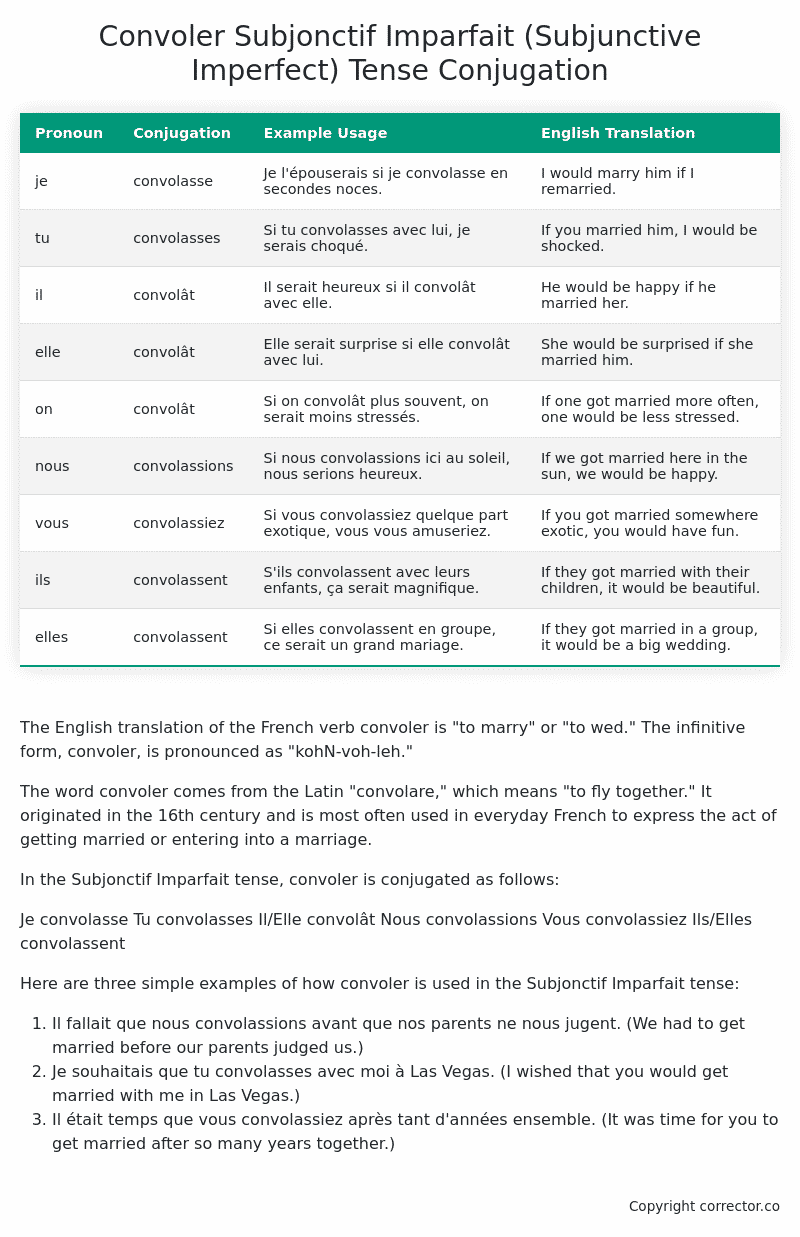Subjonctif Imparfait (Subjunctive Imperfect) Tense Conjugation of the French Verb convoler
Introduction to the verb convoler
The English translation of the French verb convoler is “to marry” or “to wed.” The infinitive form, convoler, is pronounced as “kohN-voh-leh.”
The word convoler comes from the Latin “convolare,” which means “to fly together.” It originated in the 16th century and is most often used in everyday French to express the act of getting married or entering into a marriage.
In the Subjonctif Imparfait tense, convoler is conjugated as follows:
Je convolasse
Tu convolasses
Il/Elle convolât
Nous convolassions
Vous convolassiez
Ils/Elles convolassent
Here are three simple examples of how convoler is used in the Subjonctif Imparfait tense:
- Il fallait que nous convolassions avant que nos parents ne nous jugent. (We had to get married before our parents judged us.)
- Je souhaitais que tu convolasses avec moi à Las Vegas. (I wished that you would get married with me in Las Vegas.)
- Il était temps que vous convolassiez après tant d’années ensemble. (It was time for you to get married after so many years together.)
Table of the Subjonctif Imparfait (Subjunctive Imperfect) Tense Conjugation of convoler
| Pronoun | Conjugation | Example Usage | English Translation |
|---|---|---|---|
| je | convolasse | Je l’épouserais si je convolasse en secondes noces. | I would marry him if I remarried. |
| tu | convolasses | Si tu convolasses avec lui, je serais choqué. | If you married him, I would be shocked. |
| il | convolât | Il serait heureux si il convolât avec elle. | He would be happy if he married her. |
| elle | convolât | Elle serait surprise si elle convolât avec lui. | She would be surprised if she married him. |
| on | convolât | Si on convolât plus souvent, on serait moins stressés. | If one got married more often, one would be less stressed. |
| nous | convolassions | Si nous convolassions ici au soleil, nous serions heureux. | If we got married here in the sun, we would be happy. |
| vous | convolassiez | Si vous convolassiez quelque part exotique, vous vous amuseriez. | If you got married somewhere exotic, you would have fun. |
| ils | convolassent | S’ils convolassent avec leurs enfants, ça serait magnifique. | If they got married with their children, it would be beautiful. |
| elles | convolassent | Si elles convolassent en groupe, ce serait un grand mariage. | If they got married in a group, it would be a big wedding. |
Other Conjugations for Convoler.
Le Present (Present Tense) Conjugation of the French Verb convoler
Imparfait (Imperfect) Tense Conjugation of the French Verb convoler
Passé Simple (Simple Past) Tense Conjugation of the French Verb convoler
Passé Composé (Present Perfect) Tense Conjugation of the French Verb convoler
Futur Simple (Simple Future) Tense Conjugation of the French Verb convoler
Futur Proche (Near Future) Tense Conjugation of the French Verb convoler
Plus-que-parfait (Pluperfect) Tense Conjugation of the French Verb convoler
Passé Antérieur (Past Anterior) Tense Conjugation of the French Verb convoler
Futur Antérieur (Future Anterior) Tense Conjugation of the French Verb convoler
Subjonctif Présent (Subjunctive Present) Tense Conjugation of the French Verb convoler
Subjonctif Passé (Subjunctive Past) Tense Conjugation of the French Verb convoler
Subjonctif Imparfait (Subjunctive Imperfect) Tense Conjugation of the French Verb convoler (this article)
Subjonctif Plus-que-parfait (Subjunctive Pluperfect) Tense Conjugation of the French Verb convoler
Conditionnel Présent (Conditional Present) Tense Conjugation of the French Verb convoler
Conditionnel Passé (Conditional Past) Tense Conjugation of the French Verb convoler
L’impératif Présent (Imperative Present) Tense Conjugation of the French Verb convoler
L’infinitif Présent (Infinitive Present) Tense Conjugation of the French Verb convoler
Struggling with French verbs or the language in general? Why not use our free French Grammar Checker – no registration required!
Get a FREE Download Study Sheet of this Conjugation 🔥
Simply right click the image below, click “save image” and get your free reference for the convoler Subjonctif Imparfait tense conjugation!

Convoler – About the French Subjonctif Imparfait (Subjunctive Imperfect) Tense
Formation
Common Everyday Usage Patterns
Interactions with Other Tenses
Subjonctif Présent
Indicatif Passé Composé
Conditional
Conditional Perfect
Summary
I hope you enjoyed this article on the verb convoler. Still in a learning mood? Check out another TOTALLY random French verb conjugation!


